The strangest thing: my younger kids think television coming over our old aerial—complete with commercials and limited choice of channels—is the coolest thing now (high tech burnout was inevitable). And one of their favorite digital channels is our local MeTV outlet, with its old timey sched of classic television fare (yes, they have taste, but of course, I’m shilling for a potential job offer, too…). So the upcoming “Summer of Me” programming change this Monday should be a lot of fun for them—and for you, too, particularly since The Jeffersons will be movin’ on up into the primo 6:30pm (Eastern) timeslot (now you don’t have to watch the fake news!).
By Paul Mavis
I was scanning the TV trades the other day, keeping abreast of all the fall pick-ups I’m going to avoid like the plague because nobody watches crappy, P.C. pasteurized network television anymore (can I have one more show with a bunch of kooky millennials solving crimes and puzzles and stuff, please?), when I saw that legendary producer Norman Lear had his long-gestating retirement home sitcom, Guess Who Died, shot down by NBC.
Click to purchase The Jeffersons: The Complete Series at Amazon.
Your purchase helps pay the bills at this website!
There was a time in the mid-70s when Norman Lear could have blown his nose into a Kleenex and Fred Silverman and Herb Schlosser would have knocked heads diving onto that thing. Lear, the co-developer and/or “creator” of such iconic television fare as All in the Family, Good Times, Maude, Sanford and Son, and One Day at a Time, could get his wife’s laundry list a 13-episode mid-season pick-up if he so desired, such was his cache with the networks back in the 1970s.

Times change, of course (traditional network TV as we know it won’t be around very much longer, one suspects…), but what hasn’t changed are the laughs you can still get from Lear’s series—particularly from his longest-running but least-appreciated show, The Jeffersons. A spin-off of Norman Lear’s seminal sitcom, All in the Family, The Jeffersons never got the respect it deserved from critics or CBS (nor even from Lear, quite frankly) during its impressive ten and a half seasons run. Audiences, however, couldn’t have cared less about that—the reason being the simplest of all: The Jeffersons was reliably, predictably, reassuringly funny, season after season. A few years back, Shout! Factory, the white knight of abandoned vintage TV-on-DVD series, released The Jeffersons—The Complete Series: The Dee-Luxe Edition, a sleek 6-volume, 33-disc collection of the classic CBS sitcom. So…let’s minutely detail each and every one of those 253 episodes!
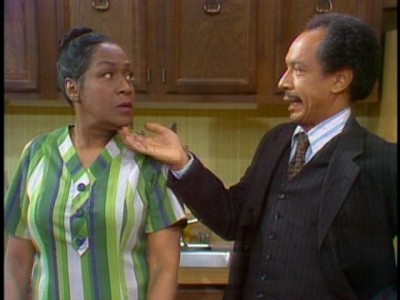 Actually…let’s not (my editor just cracked open his second Courvoisier in celebration). But we can look at the series as a whole. When All in the Family hit the airwaves at midseason in 1971, the first rumblings of a seismic evolution in what television could say and do occurred, and no question about it, producer Norman Lear was largely responsible for this (many would include Lear’s partner, Bud Yorkin, in that equation, too, although funny enough…Lear doesn’t mention him so often).
Actually…let’s not (my editor just cracked open his second Courvoisier in celebration). But we can look at the series as a whole. When All in the Family hit the airwaves at midseason in 1971, the first rumblings of a seismic evolution in what television could say and do occurred, and no question about it, producer Norman Lear was largely responsible for this (many would include Lear’s partner, Bud Yorkin, in that equation, too, although funny enough…Lear doesn’t mention him so often).
RELATED | More TV sitcom reviews
Now it’s true (and an important fact to remember when assessing his legacy) that Lear’s two greatest hits—All in the Family and Sanford and Son—were actually Americanized reworkings of already established hit British TV series, and that most subsequent outings in the Lear canon were spin-off variations of these previous basic formulas. However, he oversaw the producers and writers and incredibly talented casts that made shows like Maude, Good Times, The Jeffersons, and Mary Hartman, Mary Hartman so memorable, so he gets—right or wrong—the lion’s share of the credit for orchestrating, essentially, a new way of looking at television.

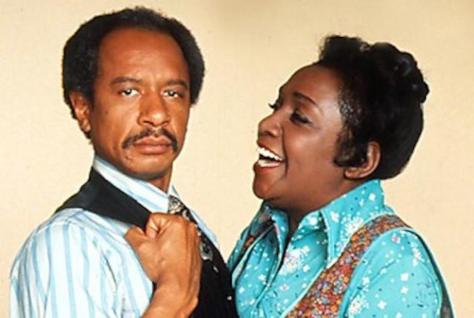 If you were one of the tens of millions of viewers who tuned into All in the Family during that first 1971 half-season, then you’d know that right next door to the heated Bunker-Stivic household, the changing dynamics of the America beyond Archie Bunker’s domain of easy chair, TV, and flushing toilet was represented by black neighbors, the Jeffersons: sweet-tempered, loving Louise Jefferson (Isabel Sanford), the best friend of Archie’s “dingbat” wife, Edith; Louise’s ingratiating, stealth smart-assed college student son, Lionel (Mike Evans), and Louise’s husband George…who wasn’t actually seen until 1973. Instead, George’s brother, Henry (Mel Stewart), represented the racial irritant to Archie’s bigoted complacency.
If you were one of the tens of millions of viewers who tuned into All in the Family during that first 1971 half-season, then you’d know that right next door to the heated Bunker-Stivic household, the changing dynamics of the America beyond Archie Bunker’s domain of easy chair, TV, and flushing toilet was represented by black neighbors, the Jeffersons: sweet-tempered, loving Louise Jefferson (Isabel Sanford), the best friend of Archie’s “dingbat” wife, Edith; Louise’s ingratiating, stealth smart-assed college student son, Lionel (Mike Evans), and Louise’s husband George…who wasn’t actually seen until 1973. Instead, George’s brother, Henry (Mel Stewart), represented the racial irritant to Archie’s bigoted complacency.
 The reason George was only mentioned and not seen during those first seasons was due to the fact that Lear had always wanted Broadway star Sherman Hemsley to play George, but had to wait out Hemsley’s Purlie contract before he could cast him. Once that happened, Hemsley’s pint-sized, cock-sure, bragging racist George became an eagerly-anticipated, “breakout” element of All in the Family, a supporting player, along with Sanford (who played beautiful straight-man counterpoint to Hemsley), that Lear knew could carry their own show (even if Sanford did not, who made it part of her contract that she could return to All in the Family if The Jeffersons didn’t work out).
The reason George was only mentioned and not seen during those first seasons was due to the fact that Lear had always wanted Broadway star Sherman Hemsley to play George, but had to wait out Hemsley’s Purlie contract before he could cast him. Once that happened, Hemsley’s pint-sized, cock-sure, bragging racist George became an eagerly-anticipated, “breakout” element of All in the Family, a supporting player, along with Sanford (who played beautiful straight-man counterpoint to Hemsley), that Lear knew could carry their own show (even if Sanford did not, who made it part of her contract that she could return to All in the Family if The Jeffersons didn’t work out).
 When trying to determine what the show’s format would be, Lear remembers getting a light bulb about the Jeffersons. The Jeffersons would finally achieve real wealth and move to a high-rise, and this idea came from none other than the Black Panthers, “a militant civil rights group from the sixties and seventies,” states Lear, three of whom supposedly stormed his office one day (which I don’t believe at all…but what a charming euphemism for a deadly terrorist organization that also apparently offered episodic television story ideas on their days off—I guess if you want to hear Lear say nasty things, ask him about the religious Right).
When trying to determine what the show’s format would be, Lear remembers getting a light bulb about the Jeffersons. The Jeffersons would finally achieve real wealth and move to a high-rise, and this idea came from none other than the Black Panthers, “a militant civil rights group from the sixties and seventies,” states Lear, three of whom supposedly stormed his office one day (which I don’t believe at all…but what a charming euphemism for a deadly terrorist organization that also apparently offered episodic television story ideas on their days off—I guess if you want to hear Lear say nasty things, ask him about the religious Right).
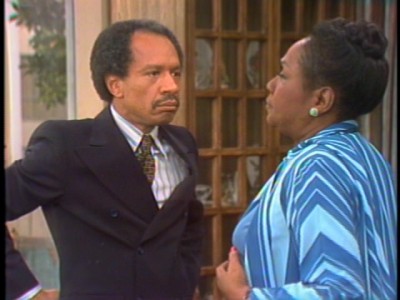 Launched as a mid-season replacement in January, 1975 (replacing the excellent, high-rated…but not highly-enough rated Grant Tinker/Mary Tyler Moore series, Paul Sand in Friends and Lovers), The Jeffersons, heralded by that stone-cold groove theme song, entered the famed CBS “Saturday Night Massacre” line-up for 1974-1975: All in the Family, The Jeffersons, The Mary Tyler Moore Show, The Bob Newhart Show, and The Carol Burnett Show. With just 13 short episodes, The Jeffersons became the fourth most-watched series of the entire season. It would run for ten more full seasons, many of them Nielsen winners, beating out All in the Family in terms of longevity to become Norman Lear’s longest running show.
Launched as a mid-season replacement in January, 1975 (replacing the excellent, high-rated…but not highly-enough rated Grant Tinker/Mary Tyler Moore series, Paul Sand in Friends and Lovers), The Jeffersons, heralded by that stone-cold groove theme song, entered the famed CBS “Saturday Night Massacre” line-up for 1974-1975: All in the Family, The Jeffersons, The Mary Tyler Moore Show, The Bob Newhart Show, and The Carol Burnett Show. With just 13 short episodes, The Jeffersons became the fourth most-watched series of the entire season. It would run for ten more full seasons, many of them Nielsen winners, beating out All in the Family in terms of longevity to become Norman Lear’s longest running show.

 So, with that kind of popular success…why no critical love for The Jeffersons? It certainly wasn’t that solid premise…or was it? Writers/producers Mickey Ross, Don Nicholl, and Bernard West, the real creators of The Jeffersons, took Archie’s neighbors and transported them to New York’s toney East Side, in a “dee-luxe apartment in the sky-eye.” George Jefferson, a venal, grasping businessman with a string of laundry stores (including one in their new apartment building), may have been (at first) as much of a bigot as Archie Bunker, but he didn’t care what color his customers were…as long as the money they kept paying him was green.
So, with that kind of popular success…why no critical love for The Jeffersons? It certainly wasn’t that solid premise…or was it? Writers/producers Mickey Ross, Don Nicholl, and Bernard West, the real creators of The Jeffersons, took Archie’s neighbors and transported them to New York’s toney East Side, in a “dee-luxe apartment in the sky-eye.” George Jefferson, a venal, grasping businessman with a string of laundry stores (including one in their new apartment building), may have been (at first) as much of a bigot as Archie Bunker, but he didn’t care what color his customers were…as long as the money they kept paying him was green.
RELATED | More TV comedy reviews
Kindly Louise, still adjusting to the notion that she was now relatively rich, and so therefore free to live a life of leisure, couldn’t get used to having her own maid, Florence (Marla Gibbs), a sassy wise-ass who took no end of pleasure in sparring with the equally contemptuous George.
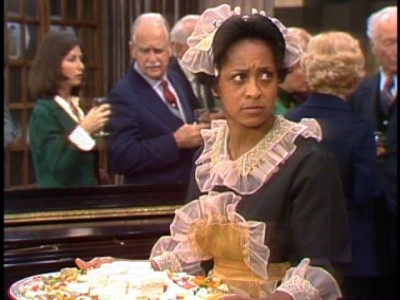 And if that wasn’t enough, Louise had to deal with George’s acid-tongued mother, Olivia “Mother” Jefferson (Zara Cully), who never wasted an opportunity to slyly dig at Louise, whom Mother Jefferson didn’t think was nearly good enough for her precious George. At least Louise had made friends with the Jeffersons’ odd next-door neighbor, Mr. Bentley (Paul Benedict), a Britisher working at the U.N.
And if that wasn’t enough, Louise had to deal with George’s acid-tongued mother, Olivia “Mother” Jefferson (Zara Cully), who never wasted an opportunity to slyly dig at Louise, whom Mother Jefferson didn’t think was nearly good enough for her precious George. At least Louise had made friends with the Jeffersons’ odd next-door neighbor, Mr. Bentley (Paul Benedict), a Britisher working at the U.N.
RELATED | Read more 1970s TV reviews
George could handle the too-upbeat Bentley (he just slammed the door in his face whenever he showed up), but Louise’s other new friends—interracial couple Helen and Tom Willis (Roxie Roker and Franklin Cover)—drove George crazy. Even worse, the Willis’ biracial daughter, Jenny (the gorgeous Berlinda Tolbert), was soon dating George’s and Louise’s handsome son, Lionel (Mike Evans, Damon Evans). George’s prejudice against whites and that “zebra” Jenny didn’t stop him, though, from courting the rich, powerful, influential whites who lived in his apartment building—the whites who could potentially help him climb even higher on the ladder of success.
 Sounds like potentially rich fodder for Lear’s patented mixture of one-sided (guess which side?) social commentary and one-liners, right? Wrong. Sure, The Jeffersons touched on themes and concerns that could be found over on All in the Family (it’s amusing to see how Lear and goofs like “TV critic” Tom Shales now seem at pains to somehow “justify” The Jeffersons‘ humor by saying it really was all about “the messages,” after all). However, The Jeffersons didn’t do that nearly as often as the Bunkers did, and when they did, the tone was still laughs first, message a far distant second (something that wasn’t always the case over at AITF, where events were becoming positively morose as its seasons wore on—would The Jeffersons ever have had an episode where Louise was almost raped? Not on your life).
Sounds like potentially rich fodder for Lear’s patented mixture of one-sided (guess which side?) social commentary and one-liners, right? Wrong. Sure, The Jeffersons touched on themes and concerns that could be found over on All in the Family (it’s amusing to see how Lear and goofs like “TV critic” Tom Shales now seem at pains to somehow “justify” The Jeffersons‘ humor by saying it really was all about “the messages,” after all). However, The Jeffersons didn’t do that nearly as often as the Bunkers did, and when they did, the tone was still laughs first, message a far distant second (something that wasn’t always the case over at AITF, where events were becoming positively morose as its seasons wore on—would The Jeffersons ever have had an episode where Louise was almost raped? Not on your life).
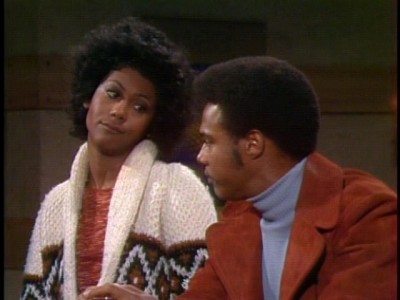 Contrary to Mr Lear’s and Mr. Shales’ rewriting of history, there was no possible way for The Jeffersons to be anything but a light farce because of its construction. In short—nothing truly bad was going to happen to the wealthy Jeffersons the way viewers at home understood “television bad” at that time: layoffs, crime, evictions, electricity shut off, heating bill too high to pay, a clunker car finally breaking down for good, food prices skyrocketing with little left over at the end of the month to buy anything. The Jeffersons were rich, baby. What was going to happen to them that was akin to what the lower-working class Bunkers faced every paycheck, or to the one-dollar-away-from-outright-poverty Evanses over on Lear’s Good Times? Nothing, that’s what.
Contrary to Mr Lear’s and Mr. Shales’ rewriting of history, there was no possible way for The Jeffersons to be anything but a light farce because of its construction. In short—nothing truly bad was going to happen to the wealthy Jeffersons the way viewers at home understood “television bad” at that time: layoffs, crime, evictions, electricity shut off, heating bill too high to pay, a clunker car finally breaking down for good, food prices skyrocketing with little left over at the end of the month to buy anything. The Jeffersons were rich, baby. What was going to happen to them that was akin to what the lower-working class Bunkers faced every paycheck, or to the one-dollar-away-from-outright-poverty Evanses over on Lear’s Good Times? Nothing, that’s what.
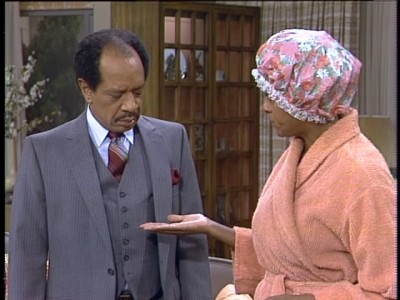 The Jeffersons had made it. They had “moved on up,” and George knew it. That’s why he was always crowing and smiling. A continual appreciation for where the Jeffersons wound up, rather than always bitterly looking back at how hard things used to be, marked George’s overall attitude (dangerous heresy in today’s world of deliberately fomented racial discontent and perpetual victim classes…regardless of their achievements). Even the look of the series spelled “bouncy.” Whereas the cramped, moldering brown and yellowed Bunker household looked exactly like its inhabitants’ namesake over on All in the Family—as dingy and serious as some of its harsher storylines—George’s and Louise’s luxury high-rise apartment was bright and spacious and airy…just like The Jeffersons‘ comedy.
The Jeffersons had made it. They had “moved on up,” and George knew it. That’s why he was always crowing and smiling. A continual appreciation for where the Jeffersons wound up, rather than always bitterly looking back at how hard things used to be, marked George’s overall attitude (dangerous heresy in today’s world of deliberately fomented racial discontent and perpetual victim classes…regardless of their achievements). Even the look of the series spelled “bouncy.” Whereas the cramped, moldering brown and yellowed Bunker household looked exactly like its inhabitants’ namesake over on All in the Family—as dingy and serious as some of its harsher storylines—George’s and Louise’s luxury high-rise apartment was bright and spacious and airy…just like The Jeffersons‘ comedy.
 The character of George Jefferson is often thought of as a black version of Archie Bunker, but the set-up here mitigates a lot of the sting of George’s racism—racism that eventually fades as the seasons wear on (an admirable demand by Hemsley, who insisted quite early in the run that George “evolve” away from what he deemed unrealistic: that George wouldn’t grow to like his white neighbors). After all, the Jeffersons don’t live in a cramped, rundown “neighborhood” like Archie, but rather in a high rise building, where their immediate neighbor is an Englishman who is removed from America’s racial history. George’s other neighbors are rarely seen, but they take him for what he is: rich. He may be black, and some may not like that, but he’s rich first, just like themselves.
The character of George Jefferson is often thought of as a black version of Archie Bunker, but the set-up here mitigates a lot of the sting of George’s racism—racism that eventually fades as the seasons wear on (an admirable demand by Hemsley, who insisted quite early in the run that George “evolve” away from what he deemed unrealistic: that George wouldn’t grow to like his white neighbors). After all, the Jeffersons don’t live in a cramped, rundown “neighborhood” like Archie, but rather in a high rise building, where their immediate neighbor is an Englishman who is removed from America’s racial history. George’s other neighbors are rarely seen, but they take him for what he is: rich. He may be black, and some may not like that, but he’s rich first, just like themselves.
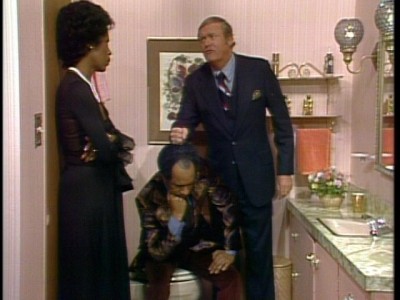 The interracial Willises provide a convenient target for George’s racism (it’s directed at other blacks, as well as whites—George throws around “nigger” as much as “honky”). Eventually, however, he becomes as tolerant of them as he is of Mr. Bentley, whom he seems to genuinely like…when he’s not slamming the door in his face in mid-sentence (which happens constantly, and always to big laughs). Above all else for George, money seems to be his key motivating factor. He may call Louise’s Uncle Walt a “Tom” in one early episode, but Walt correctly counters that George is no different when he kowtows to the rich whites for their money and influence. Money and status are everything to George…until, of course, family matters supersede that craving for success, and his true colors—if you will—are shown (Hemsley is adept at showing George be sweet or salty). Eventually, George turns out to be no different than Archie in that his family comes first, regardless (or in spite) of his own fading prejudices.
The interracial Willises provide a convenient target for George’s racism (it’s directed at other blacks, as well as whites—George throws around “nigger” as much as “honky”). Eventually, however, he becomes as tolerant of them as he is of Mr. Bentley, whom he seems to genuinely like…when he’s not slamming the door in his face in mid-sentence (which happens constantly, and always to big laughs). Above all else for George, money seems to be his key motivating factor. He may call Louise’s Uncle Walt a “Tom” in one early episode, but Walt correctly counters that George is no different when he kowtows to the rich whites for their money and influence. Money and status are everything to George…until, of course, family matters supersede that craving for success, and his true colors—if you will—are shown (Hemsley is adept at showing George be sweet or salty). Eventually, George turns out to be no different than Archie in that his family comes first, regardless (or in spite) of his own fading prejudices.
 If anything, George’s essentially positive attitude and his grudging willingness to meet whites halfway, make him a far more happy person than Archie, who tries unsuccessfully to cling to past ways. That happiness is the lift in The Jeffersons‘s overall tone. And for that decision to stay essentially a “happy” sitcom farce, the critics either reviled The Jeffersons…or just ignored it (its own “creator,” Norman Lear, devotes a whopping 2 ½ superficial pages to it—his longest-running, arguably most financially successful show—in his 450 page autobiography). TV critics (yeech) loved Lear back in the ’70s because they—and Lear—believed he was doing something “better” than the television they had been watching for the past twenty years…which is nonsense, of course. His canon was just “different,” not “better.”
If anything, George’s essentially positive attitude and his grudging willingness to meet whites halfway, make him a far more happy person than Archie, who tries unsuccessfully to cling to past ways. That happiness is the lift in The Jeffersons‘s overall tone. And for that decision to stay essentially a “happy” sitcom farce, the critics either reviled The Jeffersons…or just ignored it (its own “creator,” Norman Lear, devotes a whopping 2 ½ superficial pages to it—his longest-running, arguably most financially successful show—in his 450 page autobiography). TV critics (yeech) loved Lear back in the ’70s because they—and Lear—believed he was doing something “better” than the television they had been watching for the past twenty years…which is nonsense, of course. His canon was just “different,” not “better.”
 I can find as much “meaning” and surreal humor that is in Lear’s All in the Family and in Larry David’s Seinfeld, in something as loathed today as The Adventures of Ozzie and Harriet—but critics don’t want to hear such favorable comparisons (it doesn’t fit in with the Muzak of their group-think). So when The Jeffersons came out of the gate more “light” than “dark” (sure I did that!), skipping the heavy dramatics of its host series AITF for a farcical, fast-paced The Honeymooners Meets The Beverly Hillbillies hybrid, the critics screamed “sell out!” and “Uncle Tom-ism!” and wrote off The Jeffersons (particularly disgusting were the black writers and commentators who maligned and derided Hemsley’s absolutely brilliant physical comedy as some kind of throwback to minstrel-like appeasement for white audiences. What utter nonsense).
I can find as much “meaning” and surreal humor that is in Lear’s All in the Family and in Larry David’s Seinfeld, in something as loathed today as The Adventures of Ozzie and Harriet—but critics don’t want to hear such favorable comparisons (it doesn’t fit in with the Muzak of their group-think). So when The Jeffersons came out of the gate more “light” than “dark” (sure I did that!), skipping the heavy dramatics of its host series AITF for a farcical, fast-paced The Honeymooners Meets The Beverly Hillbillies hybrid, the critics screamed “sell out!” and “Uncle Tom-ism!” and wrote off The Jeffersons (particularly disgusting were the black writers and commentators who maligned and derided Hemsley’s absolutely brilliant physical comedy as some kind of throwback to minstrel-like appeasement for white audiences. What utter nonsense).
 Luckily, nobody listens to critics (ahem), and The Jeffersons racked up a truly impressive 10 1/2 year run. It went up and down in the ratings, often because of where CBS moved it on its schedule—an insane 16 times (almost as if they wanted to kill it off)—while later seasons sometimes felt a little tired or pat (as Hemsley and Sanford inevitably slowed down). However, no matter what the lines were, or what the silly situations, the performers carried the ball. Isabel Sanford, a potent combination of straight-man and potential harpy wife, is the perfect foil to the bantam rooster Hemsley (until Marla Gibb’s smart-assed Florence the maid character largely took over that role—a loss, I think, for the talented Sanford).
Luckily, nobody listens to critics (ahem), and The Jeffersons racked up a truly impressive 10 1/2 year run. It went up and down in the ratings, often because of where CBS moved it on its schedule—an insane 16 times (almost as if they wanted to kill it off)—while later seasons sometimes felt a little tired or pat (as Hemsley and Sanford inevitably slowed down). However, no matter what the lines were, or what the silly situations, the performers carried the ball. Isabel Sanford, a potent combination of straight-man and potential harpy wife, is the perfect foil to the bantam rooster Hemsley (until Marla Gibb’s smart-assed Florence the maid character largely took over that role—a loss, I think, for the talented Sanford).
 I’m not sure what else can be said about Hemsley’s portrayal of George: if you’ve seen it, even once, then you know it’s a marvelously funny creation. Strutting around like a peacock, or glowering like an insane madman (that’s when I find him the funniest), the minute Hemsley got on his tip-toes before screaming some insult, or Sanford calmly crossed her arms and stared him down, or Gibbs took a perfect three-beat pause and blew Hemsley away with a withering put-down, The Jeffersons scored big laughs. Repeatedly. Reliably. Season after season.
I’m not sure what else can be said about Hemsley’s portrayal of George: if you’ve seen it, even once, then you know it’s a marvelously funny creation. Strutting around like a peacock, or glowering like an insane madman (that’s when I find him the funniest), the minute Hemsley got on his tip-toes before screaming some insult, or Sanford calmly crossed her arms and stared him down, or Gibbs took a perfect three-beat pause and blew Hemsley away with a withering put-down, The Jeffersons scored big laughs. Repeatedly. Reliably. Season after season.
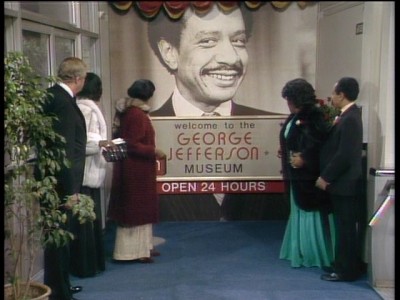
 And that’s all it had to do to secure a continuing audience that still watches it today in syndicated reruns…while its host series All in the Family is largely off the pop culture radar. All in the Family certainly has a place in the history books as one of the most influential sitcoms to ever grace the airwaves. No question. But its relentless topicality badly dates it, while The Jeffersons’s timeless farce elements keep it fresh. It may not be scientific, but if you took a still photo of Archie and Edith Bunker, and one of George and “Weezy” Jefferson (you’re already laughing at that “Wheezy,” aren’t you? You can hear Hemsley saying it, right?), and you put both of those stills down in front of a TV child of the ’70s, I can absolutely guarantee that that viewer is going to smile broader when they see Sanford and Hemsley. All in the Family has the respect…while The Jeffersons has the love.
And that’s all it had to do to secure a continuing audience that still watches it today in syndicated reruns…while its host series All in the Family is largely off the pop culture radar. All in the Family certainly has a place in the history books as one of the most influential sitcoms to ever grace the airwaves. No question. But its relentless topicality badly dates it, while The Jeffersons’s timeless farce elements keep it fresh. It may not be scientific, but if you took a still photo of Archie and Edith Bunker, and one of George and “Weezy” Jefferson (you’re already laughing at that “Wheezy,” aren’t you? You can hear Hemsley saying it, right?), and you put both of those stills down in front of a TV child of the ’70s, I can absolutely guarantee that that viewer is going to smile broader when they see Sanford and Hemsley. All in the Family has the respect…while The Jeffersons has the love.
PAUL MAVIS IS AN INTERNATIONALLY PUBLISHED MOVIE AND TELEVISION HISTORIAN, A MEMBER OF THE ONLINE FILM CRITICS SOCIETY, AND THE AUTHOR OF THE ESPIONAGE FILMOGRAPHY. Click to order.


Great perspective on this show. It had its subtle political angles but you’re right, it was played strictly for laughs. I didn’t like the fake Lionel. Mike Evans was the best one and original of course. A very enjoyable show but by the end it became unwatchable and was long in the tooth. It never jumped the shark but was a shadow of itself by 1985. Great ensemble however. And the worst episodes beat virtually anything on today. Just my opinion!
LikeLiked by 3 people
Thanks–glad you enjoyed it!!
LikeLike